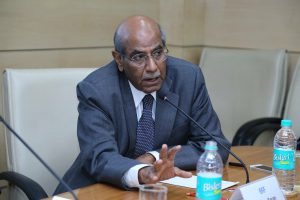India is feeling the heat for being reluctant to condemn Russia’s current actions. Amb Shyam Saran, Former Foreign Secretary and Former Chairman of the National Security Advisory Board clarified that India’s interest lies in adjusting to the existing global order conditionally and not accepting it fully at AIMA’s 57th LeaderSpeak.
India has long-standing diplomatic ties with Russia but India’s economic prospects are tied to the USA, which also plays a role in influencing India from being involved in Russian affairs, which translates to India being “neutral”.
Being one of India’s top diplomats, having served in some key countries in Asia and being a Padma Bhushan Awardee, Amb Shyam Saran rightly addressed why India is feeling the heat as it has been reluctant to condemn Russia and join the western economic war against it.
Amb Shyam Saran started off by explaining the actual meaning of the word ‘neutral’, which in international relations and diplomacy, is described as the status of the country that refrains from participation in a war with other countries and adopts an impartial attitude.
For a number of years, India has practiced non-alignment and has been a champion of the cause. Non-alignment, as Former Prime Minister of India, Jawaharlal Nehru would describe it, doesn’t mean India “sits on the fence”. It does make decisions on various foreign policy issues but takes into account its self-interests.
He further said that India along with other non-aligned countries doesn’t tie up with the Eastern Block, led by Russia nor the Western Block, led by the USA. It rather maintains strategic autonomy. It is a way to not support a military confrontation. Strategic autonomy is the ability of a country, particularly a major country like India, to be able to take relatively autonomous decisions on issues that are of priority and of importance to the country. It, however, does reconcile its interest with the world order.
An autonomous country also has to align its views with the UN Charter. Currently, it is not denying Russia’s attack on Ukraine. India has not openly criticised Russia, but hasn’t endorsed Russia’s actions either. Having taken a nuanced position on Russia’s action, it’s clear that it does not support Russia. When there was a massacre of Ukrainians in a certain place, India came fairly close to criticising Russia’s act.
There also have been talks of India not supporting Western Sanctions against Russia. India however, has made it quite clear that India is obliged to adhere to Sanctions passed by the United Nations only and not observe any other Bilateral Sanctions.
On the other vertical, India is not on the same page with the USA particularly, when it comes to buying oil from Russia with the western economy not being in support of having export dealings with Russia. India however, is simply taking advantage of the discount on the oil rates in Russia. The irony, however, is that the western countries are the biggest buyers of Russian oil.
Russia has been a very reliable friend/partner for India in the 60s to the 90s before the collapse of the former Soviet Union. It was a period of a very strong strategic partnership due to a common threat from China. But the camaraderie since, has declined over a period of years. Even if India has adopted diversity in terms of foreign policies, many of India’s exports still come from Russia.
The pressure for India hangs on as it has also been asked to choose on which side it wants to be. Many Foreign Ministers from other countries conversed on the same topic while on visits or other talks. That’s why India has compulsions of reviewing its Foreign Policy.
On the other hand, the rivalry between the USA and China is deepening more, with one being the biggest Superpower and the other, the 2nd biggest. The gap between the two countries in terms of military capabilities, economic capabilities, and even technology capabilities has become smaller. While India was being hailed as the ‘next China’ as its diplomatic options expanded, as a result of which it was able to close the Nuclear Deal with the USA.
However, the gap between India and China again started expanding from 2007 to 2008. Russia stepped in to firm its ties with China then after, their common threat being the USA. They made their relationship more apparent with Vladimir Putin, President of Russia, being the only Head of a country to attend the Winter Olympics hosted by China. The two countries also released a Joint Declaration.
Considering all the happenings that are taking place, Amb Shyam Saran finally concluded that even if India may have been profiled as being “neutral”, its balance of interest lies in adjusting to the existing global order conditionally but not accepting the order fully. The objective of India’s foreign policy is to undergo a transformation in terms of economic, technological, and even military prowess for that matter, as China has long posed a threat to India and it has to face that with its own capabilities.
Watch the full session video here- https://www.youtube.com/watch?v=zWNuU434Wfw




